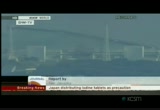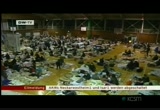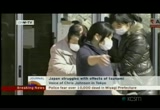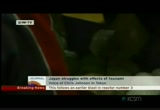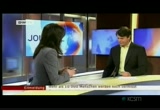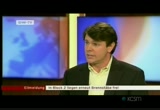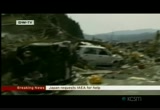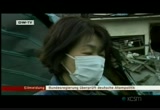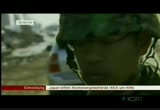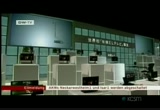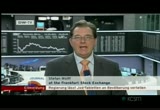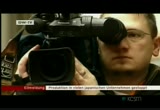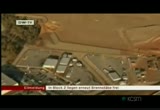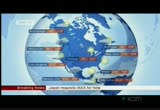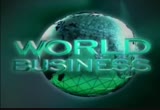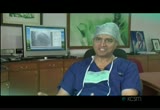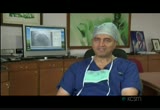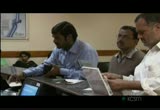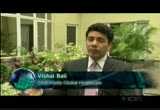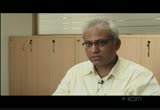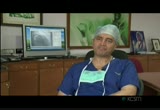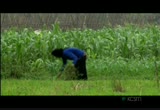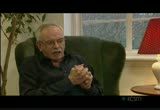tv Sino Tv Early Evening News PBS March 14, 2011 6:00pm-7:00pm PDT
6:00 pm
>> hello, everyone. welcome to special coverage of the latest events in japan. >> here's what he's happening at this moment. fears grow of a meltdown at the fukushima nuclear power plant in japan after a second explosion at the damaged facility. fuel rods and another reactor in fukushima are the u.n. regular agency says no chain reaction is taking place there.
6:01 pm
japanese engineers are stepping up efforts to prevent a meltdown at the nuclear power plant damaged in last friday's earthquake. the fukushima plant has been hit by two explosions. the latest happened early on monday. rapidly falling water levels have exposed fuel rods in another reactor, increasing the risk of a core meltdown. >> it's the third day of japan's nuclear crisis, and the situation at the fukushima power plant remains critical. now there has been a second explosion there. aerial footage shows two damaged reactor structures. a surveillance camera captured the moment of the blast which blew apart the concrete building surrending the number three reactor. the japanese government says this was a hydrogen explosion. >> we assume that there was a similar explosion at the
6:02 pm
third reactor as the one that occurred at the first reactor. at this point, we can confirm that the container of the reactor is sound. >> but the government has now officially admitted that all three reactorss at the fukushima plant are threatened with a core meltdown, and it may have already started in reactor two, because its fuel rods are now completely exposed. this is terrifying news for the thousands of local residents who evacuated the area around the power plant and have been sleeping in temporary shelters like this one just 50 kilometres from fukushima. >> people have been extremely patient so far, but the mood is beginning to shift. >> the town's response is too slow. that's whying things ended up this way. >> they said it was safe and there was nothing to worry about, and i trusted them.
6:03 pm
>> i'm very angry that they didn't tell us from the beginning to move further away. >> aid workers have been distributing blankets and food to people in the evacuation centers. now they're also giving them iodine tab helets, standard procedure following suspected radiation exposure. officials have been assuring them it is merely a precaution. people here will just have to hope that is, indeed, true. >> well, as fears grow of a meltdown at the fukushima facility, i asked our correspondent in tokyo to tell us more about the public reaction to that. >> anxiety, fear, people wondering what they should do. i mean, the government is telling people to evacuate that area and take care of their own safety, but the reality is how can people get out? i mean, they can't even get gasoline. a lot of people not only
6:04 pm
close to that area, but even in tokyo, they feel trapped right now. >> we hear that iodine is being passed out against a precaution against radiation poisoning. do we know how many people have been evacuated so far, and where can they go? >> well, the government has been saying all along it's trying to evacuate 170,000 people, but quite honestly, it's not like someone is going around and doing a head count, and where can they go? already the shelters are overwhelmed, you know, in a lot of areas. they've got shelters divided against potential radiation victims and just the sort of, i hate to say, it but regular earthquake and tsunami victims. >> we hear the death toll is expected to be over 10,000 in the tsunami devastation zone. is that even realistic? >> this is the problem that is a terrifying thing. when you add up the statements of all the
6:05 pm
various police chiefs and mayors and local officials, just in certain areas, the toll would be more than 40,000. the death toll officially, the government is saying 2,800. for some reason, the government is just being very, very conservative. basically they are afraid of scaring people, but a lot of people, i think, are -- would feel better if the government was more open about giving out information. >> more forthcoming. ok. we have to leave it there for now. we thank you for that update in tokyo. >> well, the head of the united nations nuclear energy agency says the reactors at japan's nuclear power plants remain intact and that the release of radiation has been limited. the director general of the international atomic energy agency said the crisis at the fukushima nuclear plant was unlikely to turn into an
6:06 pm
accident on the scale of the one at chernobyl in 1986. he said the main difference is that there is no chain reaction taking place at fukushima's reactors and there are differences in the design and structure of the facilities also made it unlikely that the situation would escalate to that extent. to get more analysis on the nuclear situation in japan, i am joined in the studio by our science correspondent. thanks for being with us. now, as we know, there have been two explosions at the fukushima plant. now there talk of a meltdown. what does this mean and how serious is it for the people of that area? >> well, it's potentially very serious. over 170,000 people have been evacuated in the media area. the explosions on the one hand, that's one aspect of what's happening. that was caused by elemental hydrogen released by the partial meltdowns that the japanese government is
6:07 pm
saying probably has happened. the more grave event, what they're trying to stop is a total meltdown inside the reaction chamber itself and inside the primary construction that would shield the immediate environment from more radiation. >> ok. now, in order to prevent this meltdown, what needs to be done? >> it has to be cooled but cooled very carefully because it's extremely hot there now, well over 1000 degrees celcius. when you add water to the mixture it can be very explosive. they are using seawater mixed with boron, a neutron absorber which is able to interfere with nuclear chain reactions. that is the last-ditch thing they're doing. >> how worried should the people be? >> i think that they should be -- we should all be a little bit worried at this point, but i don't think we're in for acharne noble-style incident. it's a completely different style of reactor and different construction. >> thank you for your assessment.
6:08 pm
>> well, rescue teams in japan are starting to head off a humanitarian catastrophe. simple lifesaving supplies like blankets are needed to prevent the death toll from rising. temperatures in the meantime, are dropping below zero in the worst affected areas. >> the coastal town had a population of 20,000. the are earthquake and tsunami virtually wiped it from the map. the death toll here is astronomical. rescuers have recovered more than 300 bodies, but many residents remain unaccounted for. a school must have once stood around here. this man returned to his home having heard rumors that thieves were trying to steal his few remaining possessions, but they would have found little of value.
6:09 pm
as in many other towns in fukushima other areas, the destruction unimaginable. some people were lucky. they were trapped inside their homes but largely unscathed. >> the next thing i called for help through a window. eventually firefighters came and took me to safety. >> she has returned to her hometown in desperate search of her mother. she is among the 10,000 residents who vanished without a trace. >> everything has been destroyed. i don't recognize anything anymore.
6:10 pm
>> all she finds are a few pictures from the neighbor he's photo album. soldiers continue to comb the wreckage, but find no survivors. >> we'll keep looking as long as we have just a shred of hope. teams from around the world have traveled to the devastated region. among them, a group from germany's technical relief agency. they, too, will be helping with the search and recovery efforts. >> the german president has called on germans to donate generously to the victims of the earthquake and tsunami. during a meeting with the japanese ambassador to germany, he said he had been shaken by the extent of the disaster, and that japan would receive a lot of assistance from around the
6:11 pm
world. all right. let's check in to find out more about the economic impact that this earthquake and tsunami will have. >> exactly. we're just beginning to see, japan is just beginning to face the economic cost of the catastrophe, with huge parts of the country's infrastructure damaged and power outages crippling prog ducks, japanese industry and foreign cooperations with operations there are facing a mountain of problems. >> german chemicals giant basf is among the many companies that have had to cut production in japan. all 27 of its factories are affected. above all, the world's largest chemicals company produces plastics in japan but it has faces major power disruptions because many power plants are damaged. for the population at large, a shortage of gasoline has triggered long waits at service stations. the disaster is likely to affect japan's export industry for months.
6:12 pm
a number of the country's seaports are heavily damaged and unuseable. the damage to the country's infrastructure is taking a toll on the entire economy. carmakers, including toyota and nissan, have shut down their assembly lines and it is a similar picture for another key sector, consumer electronics. last year, japan delivered 8 billion euros worth of electronic goods to germany alone. sony, the country's largest consumer electronics exporter has already ceased production at eight of its factories. >> and japanese shares tumbled monday on the first day of trading after the first day of trading after the earthquake hit the country's northeast. the nikkei session was down more than 6% monday. carmakers an insurance companies were among the leading decliners. the bank of japan injected over $130 billion euros into the financial system but
6:13 pm
couldn't stop the sell-off. only industrial and construction companies gained on hopes this he will be in demand once japan starts rebuilding. >> and europe's main stock markets also closed lower monday amid concern that the earthquake and tsunami could derail the economic recovery. our correspondent has more on how investors reacted in frankfurt. >> it's very difficult to put a disaster like that into numbers and share prices, but of course at the stock market, exactly this has to happen, so the investors looked at japan through the drewman point of view. german exporters are not hit too hard. insurers are hit hard. shares of insurance and reinsurers went down sharply here on the frankfurt floor. the dax has been driven bound more than 1 1/2%. utility shares have been hit
6:14 pm
hard. they lost because of the fact that the discussion started off about the safety of nuclear power plants here. >> now, here is a quick look at the market numbers in more detail beginning first in frankfurt where the dax closed on the day at 6866. and we head over to new york where the dow jones industrial average is also declining at 11,993. the eurois gaining against the dollar at 1.3996. well, the earthquake in japan has also had an effect on oil prices. the price of light swede crude dipped below $100 a barrel monday before rising slightly. the reason for the short-term drop in price is a temporary reduction in demand from japan, one of the world's biggest oil importers. demand is expected to pick up once reconstruction begins, at least four of japan's own refineries were
6:15 pm
shut down after the quake. meanwhile, a number of german companies are evacuating their foreign employees from japan. at bmw, 50 workers are returning to germany monday according to a spokesperson at the company's head quarters in munich. at tokyo's airports it is mostly foreigners wanting to leave the country, most of them concerned about a nuclear fallout. and the euro gained on monday on the back of an agreement on debt relief by a deal struck in the early hours of saturday. leaders meeting in brussels agreeed to increase the lending capacity of the bloc's rescue funds from $350 billion euros to $440's billion yure rose. the money can be used to buy bonds of distressed members states. >> the financial markets have reacted positively to the bailout of the buyout fund. trust in the common currency
6:16 pm
has been restored. the international markets should have understood that the euro member states are making sure that we help. >> a part of the package is that the bailout fund may buy ailing government bonds but taking over the debts of others was what germany wanted to avoid at all costs. the meeting has not changed the fact that each leader should be responsible for each of their own responsibilities and the finance minister has two weeks to fine tune the bailout package before a summit of the leaders at the end of the this month. our special coverage of the situation in japan continues after a short break.
6:18 pm
>> just like television but on the go, live stream. >> the explosions at japan's fukushima nuclear power plant have prompted many european countries to review their own safety. here in germany, chancellor angela merkel has announced that her country will suspend an agreement to extend the life of its nuclear power stations. chancellor merkel called the disaster in japan a watershed moment for germany, too. she ruled out a return to everyday business. safety at every german nuclear plant is now under review. >> we will suspend the decision to extend the life-span of germany's nuclear plants. this is a moratorium, and the moratorium will be valid
6:19 pm
for three months. >> that move could mean temporarily shutting down some of the country's oldest nuclear plants, such as the reactors in two locations. those plants have already reached the end of their life-spans. merkel said the moratorium would not require any new legislation. at the same time, the government is pushing for the development of renewable energies, but it says it has to be an e.u.-wide effort. >> we can't just back out of the world's most secure nuclear energy system only then to buy electricity from less safe plants in neighboring countries. that's not the solution we want. >> anti-nuclear activists joined members of the opposition outside the chancellor to protest the government he's nuclear energy policy. >> we don't want a moratorium. we want a complete phaseout
6:20 pm
of nuclear energy. we don't need old nuclear plants to start operating again in four months. we want the german reactors to be shut down once and for all. >> the debate over the future of nuclear energy in germany is heating up again. >> since we're already seeing a political knockout from japan's reactor fires, i asked our political correspondent if germany could decide to shut down the country's power plants. >> well, germany definitely will not be taking its 17 nuclear power plants offline right away. that would require that germany import electricity, nuclear electricity from other countries in order to make up for the 25% hole in its electricity supply, and chancellor merkel made it clear today she would not be doing this. what germany has decided to do is to simply suspend the extension of the life of its
6:21 pm
nuclear power plants for three months. what we probably will see is that a couple of those nuclear power plants, the older ones, will be coming offline sooner than expected. >> with this suspension, do you think this decision has been motivated by events in japan or upcoming elections here in germany? >> there are six state elections coming up still this year in germany. nuclear power was an issue in a couple of those already before the earthquakes in japan. the one coming in in two weeks does generate nuclear power and in that state it is going to be an issue. we can expect the government to make concessions perhaps in light of the events in japan. >> thanks very much for your political analysis. >> well, not only here in germany, but across the e. u, questions are being raised about nuclear power. the 27e.u. energy managers are expected to meet in brussels tomorrow for talks on the reactor safety.
6:22 pm
austria has demanded a quick review. the fukushima threat comes as a number of e.u. countries have been increasing their nuclear capacity as a way out of dependence on foreign oil and natural gas shipments. as updates about the ongoing struggle at the fukushima power plants continue to flood in, concern is growing in europe. especially in the nations traditionally opposed to nuclear power. >> the talks heated up quickly. we have to test how resilient they are to earthquakes and how their coating systems function. what about the reactors at the show and electricity generators and so on? >> nuclear power has seen a reemergence and finland has already approved the construction of new stations.
6:23 pm
30% of the european union's total energy needs are covered by nuclear power. france is europe's nuclear giant. 70% of its electricity comes from nuclear power. that may explain the french government's guarded reaction to the events in japan.at the moment we don't hae the information we need to form a clear picture. >> france is also hosting the e.u.'s most ambush tious and expensive nuclear project to date. work is underway on an experimental fusion reactor. the european commission is pumping $7 billion into the project, but now may have to reconsider. let's move on to other international news now, and the united arab emeritus says it has sent some 500 police officers in to bahrain to calm anti-government protests by the kingdom's shia muslim majority.
6:24 pm
earlier on monday, some 200 saudi military vehicles entered bahrain carrying troops. bahraini state television shows footage of a convoy crossing a convoy and bahrain called on other gulf states to help kwell the demonstrations which are calling for more democracy. the opposition has called the move an act of war. roadblocks set up on protestors sunday to prevent access to the financial business harbor have remained in place. >> well, the libyan government says its forces continue to make advances against rebels in the east of the country. a rebel spokesman has denied claims that government troops have regained control of the oil port of brega and are now pushing towards bengazi. >> gaddafi's sources bombarded rebel positions in and around this key town. >> airplanes came and bombed people.
6:25 pm
look. a bomb landed there. we are civilians. we are not militants. >> pictures from libyan state television suggest things are back to normal, apparently retaken by government troops on sunday. but the rebels say a bitter battle is still being fought for the town and its oil terminal. britain and france have pushed for a no-fly zone. >> we're having technical difficulties, but let's just have a quick recap of the main developments for you at this hour. engineers are working around the clock to stabilize the situation at the fukushima nuclear power plant, but they say they cannot rule out a reactor meltdown, and an explosion occurred at reactor number three earlier on monday. however, authorities say the core container remains intact. >> nuclear fuel rods in the reactor unit number two have been reexposed.
6:26 pm
the rescue operation on japan's northeast coast continues, and the police do fear that the death toll will rise to more than 10,000. meanwhile, german chancellor merkel has announced berlin is suspending an agreement to extend the life of the country's nuclear plants. we leave you now with the latest developments. we will continue to keep you updated on the latest developments here and we would like to leave you with some images from the japanese disaster. so stay tuned.
6:30 pm
>>this week on world business... how fears about the ndm-1 superbug affected the indian medical tourism industry i've worked in different parts of the world, in different hospitals, and resistant bacteria is common in every hospital, in every intensive care unit. naming bacteria after a country or after a city, especially when the country is trying to promote itself a medical tourism destination, i thought it wasn't a medical reason, the reason was something else. and vietnam may be expanding at a staggering rate, but with high debts and soaring inflation the country still has plenty of issues it needs to deal with. if vietnam doesn't slow down right now, it needs to slow down credit , it needs to raise interest rates and it needs to reign in external deficit, if it doesn't do that i'm afraid we're heading towards bubble territory.
6:31 pm
plus why breaking up can be good for business, we drop in at the divorce expo in paris. >>hello and welcome. i'm raya abirached and this is world business, your weekly insight into the global business trends shaping our lives. last year, a medical study in the west created a global furore when it claimed to identify a drug-resistant superbug originating from india. indian authorities however were quick to refute the study, in particular its claims that foreign patients going to indiafor medical treatment could be infected. >>reporter researchers: in britain claim there's a new bug in town. the ndm-1
6:32 pm
superbug, short for new delhi metallo-1 can spread rapidly and is extremely immune to antibiotics. but many in india thinkthis label stigmatizes the city and even the entire country. >>dr. shetty: i've worked in different parts of the world, in different hospitals, and resistant bacteria is common in every hospital, in every intensive care unit. naming bacteria after a country or after a city, especially when the country is trying to promote itself a medical tourism destination,i thought it wasn't a medical reason, the reason was something else. >>reporter: even those who believe that concerns over drug resistance are valid, disagree with the report's controversial conclusion that advises against medical tourism to india. >>dr. kakkar: there is no mention of the sample size calculation, there is no mention of the difference they are trying to demonstrate between one group and the other group. even
6:33 pm
the sample that is available, if you focus on the question of medical tourism, which means patients coming from uk or anywhere else and getting admitted to the hospitals...it's only about 14 patients. >>reporter: the report has so far had a limited effect on the indian medical tourism business. the industry is still growing and predicted to be worth over 2 billion dollars by 2012, with westerners lured by high quality healthcare at knock down prices. often administered by doctors trained in the very countries they can no longer afford treatment in. >>schmeeckle: i talked to several different people who had been to india - some to new delhi and some to other places - and they all just loved it. one lady we talked to, her only regret was not having both knees done. so i had heard positive things from lots of different people, so i thought, well,i have to do this.
6:34 pm
>>reporter: 60-year old kimberly schmeeckle is recovering from knee replacement surgery on both her legs. the cost of the entire trip, came to under 20,000 dollars. a similar operation in the us wouldhave set her back by almost 150,000 dollars. and many are following suit. >>bali: our international arrivals - particularly from the developed world - are up by about 35 percent over last year. so the way that we are looking at it and particularly we are seeing a lot more traction happen from the us and we are seeing many more patients come from the european union. >>reporter: it's not just the price that brings them here. british resident evgenia tomlin has brought her father all the way to bangalore for knee replacement surgery, and says his recovery has been remarkable. >>tomlin: oh he's brilliant i am so thrilled about this. it's wonderful because i couldn't believe it. my dad, his first operation was 8 days ago, and his second operation was 4 days after. and he's walking! but we had to use
6:35 pm
a wheelchair to bring my dad to india. so it's marvelous. >>reporter: outside the main hospitals however, the healthcare system in india remains poor. infection control isn't a huge priority and this recent scare has highlighted a rampant overuse of antibiotics, which can frequently lead to the evolution of resistant superbugs. >>dr. kakkar: we know there is a huge problem of over-the counter availability of anti-microbials. it is very easily available and a lot of people on their own, and on the prescription of the chemistsand pharmacies, they are using these anti-microbials when they are not required...there is a lot ofpractice of prescribing multiple drugs, when only a single or a couple of drugs could be used...so all these factors they come together and the are allowing the pathogens to be exposed irrationally to various
6:36 pm
anti-microbials. >>reporter: for westerners the experience will most likely be a modern, state of the art hospital able to undercut us and european equivalents by sheer economies of scale. at the narayana hrudayalaya hospital in bangalore, doctors perform 35 heart surgeries in a single day. >>dr. shetty: in the us, when a heart surgeon retires, at the end of 25-30 years of active professional life, he would have done 2,000 to 3,000 surgeries in his whole life. we have surgeons who have done more than 3,000 surgeries and they're only in their 30s, and our nurses are 10 times more experienced and our technicians are 10 times more experienced. so today we can afford to have any machine that an american hospital can afford, and we have people who are 10 times more experienced than them. >>reporter: this hospital now sees patients from over 74 countries and like the wider medical tourism industry seems not to have suffered too many ill effects from the scare.
6:37 pm
>>last week we looked at the huge leaps forward made by vietnam after it began economic reforms in the mid 80s. the progress made by the country is undeniably impressive, but it still faces some serious issues.... >>reporter: there is an energy to modern vietnam - even an it fair calls for cheerleaders and dance troupes.e >>it's an this energy proving attractive to foreign investors like intel, which has invested 1 billion us dollars here, building this high tech processing plant just outside ho chi minh city, but evenfor firms prepared to plough huge sums into the country there is a feeling of caution. >>howarth: what i find in the government is willingness, they want to grow their industry and they want to go change their economy they're very conservative
6:38 pm
but conservative because they don't know and don't have resources of some other countries around here that they can make mistakes. they're very methodical, and ask lots of questions which i think is prudent, again trying to avoid making a mistake that will set them in the wrong direction >>richards: you've got lower lever officials who should be making decisions but they need to get theapproval of those further up the chain and sometimes that goes all the way to the prime minister's desk, so there is a lack of devolved decision making in vietnam >>baweja: truth be told, the problem is less so than other emerging economies right, if you considerhow long it takes to open a private company in a country like vietnam compared to india, vietnam compares favourably right where you have lack of transparency is policy setting. >>reporter: for 25 years, since economic reforms began, vietnam has been moving in the right direction,
6:39 pm
transforming itself almost beyond recognition. from the brink of starvation and ravaged by war it is now a vibrant, rapidly growing and modernising economy. >>baweja: vietnam is the rising dragon of the east if you consider the growth numbers but it is a dragon on steroids >>richards: so there is real pride in the way the country has developed but there is a long way to go yet before it is seen as one of the leaders in the south east asia region. >>reporter: gdp is growing at nearly 7 percent, a figure many western economies can only dream of, yet there is an increasing fear this growth is unsustainable./e >>baweja: if vietnam doesn't slow down right now, it needs to slow down credit , it needs to raise interest rates and it needs to reign in external deficit, if it doesn't do that i'm afraid we're heading towards bubble territory. >>reporter: inflation is already rampant, hitting 11.8% in december 2010 on a year on year basis. the dong has been devalued three times since last year. and there is a current account deficit
6:40 pm
of $2 billion dollars. >>thanh tam: our growth rate is 6.7 % but actually inflation 11%. a growth rate of 6.7% inflation needs to be the same or lower, otherwise it means the real economy is low. that is why vietnam needsto improve >>reporter: meaning this stellar growth may all count for nothing to the man on the street, presenting a real issue in a country already suffering from serious inequality. >>baweja: i think the government has to keep a very keen eye on social unrest especially in an economy that is overheating, because unlike the developed world in the developing world food prices comprise of a very large part of the overall consumer basket, and if food prices and consumer prices in general are rising it's a big tax on the have nots >>reporter: while in the cities young upwardly mobile youngsters snap up mobile phones and the latest fashions in rural vietnam - which accounts for 75%
6:41 pm
of the population a quarter of people live on less than $1.25 a day >>it's a deepening divide posing some say the nation's greatest threat. >>professor weeks: if you begin to get ostentatious displays of wealth, which you're beginning to get now, i think there is going to be quite a social strain, i think that is probably the greatest danger the government faces >>richards: if economic growth slows, you start seeing unemployment rise this could create social problems, anti government sentiment and this is something the government is very fearful of. >>professor dinh: there are still big gaps and in the future i think we need to have a new model that combines high growth and equity. >>reporter: a new model that requires inward investment, especially in infrastructure to link the booming cities to rural areas. it's estimated about 120 billion dollars is required for railways, roads,
6:42 pm
electricity and water supplies. >>yet despite steps to open up the economy, the government remains extremely conservative, too oftenbureaucratic red tape and an economy dominated by large state-owned groups put off would be investors. >>professor weeks: if foreign investors hoping for a vietnam in five years that has an independent central bank, a floating exchange rate an open capital account then they are going to be disappointed. >>richards: things have really changed in the last 10, 20 years. but there's still a sense the communist party have this controlling mentality, where it's really reluctant to go the whole way/e >>professor weeks: i think it will remain screened. the vietnamese government is not just about to open things and particularly, it's not about to let foreign investors enter into a bidding match over vietnamese resources, now
6:43 pm
having said that if you are a foreign investor you can make a lot of money in vietnam. >>reporter: the country is freeing up, but with the communist legacy looming large, changes will be small and will not happen overnight. >>baweja i think this is going to be a slow process, i don't think they will, i think they will begin to let go of key things like interest rates and credit rationing, but over a period of time, this is not something that will change over the next two years >>reporter: that said, if you listen to the country's successful businessmen, the future for vietnamis the focus and looks to be a bright one. >>trung: the thinking of the vietnamese people is very positive and that's important, everyone thinks tomorrow is better and that we can do something tomorrow and we don't have time to think of the past, that's the key element to the fast development of the economy
6:44 pm
>>still to come on world business... >>half of modern marriages end in failure and a whole industry has sprung up to cater for the business of divorce >>and the sport with runaway bulls that has become a runaway success in the us >>we'll sell almost 2m tickets this year just in the united states. and then we've got events in canada, brazil, mexico and australia too. >>bucking the downturn... and the rest in just a moment on world business... >>in western europe the number of divorces has increased three fold over the past thirty years. while a breakup can be a traumatic experience for those involved, it has created a whole new industry for businesses helping couples muddle through their break up and then get on with the rest
6:45 pm
of their lives. >>reporter: sophie and eric married last year and have invited some friends over to celebrate the anniversary. it's just as well they haven't been put off by their friends. bruno here is on his secondmarriage. marie and jean marie are a new couple - both are divorcees. same thing with christophe and his girlfriend. in fact nearly half of the guests have gone through a divorce. >>and in fact statistics show that is the new norm. one in two marriages in french cities now end infailure. >>taboos related to divorce have disappeared. take the french president - nicholas sarkozy twice divorced - is - currently married to a far younger ex supermodel carla bruni. >>bockman: "while a divorce is rarely a pleasant experience for those involved, businesses are now waking up to the stark reality that relationship breakdown represents a multi billion dollar marketing
6:46 pm
opportunity for them at least." >>reporter: this trade show in paris is a first. called the "divorce and new beginning expo" its brought together more than a hundred different businesses all looking to profit from heartbreak. >>gaumet: "of course getting divorced has created a business opportunity but nobody accuses doctors of profiting from the illness of their patients. what we are doing is bringing together businesses from all walks of life under one roof to help people at a difficult point in their life." >>reporter: money and custody are still the key sticking point in around 60 percent of separations.so it's no surprise lawyers and tax accountants are on hand. their advice is eagerly accepted here because it's free. in their offices can cost up to 280 dollars an hour. >>veronique: "my divorce is extremely complicated because there is the problem of property that has to be settled. today i am so caught
6:47 pm
up over the issues of my separation that everything to do with giving myself a new look, a new start on life and the rest will have to wait." >>reporter: even private detectives are on hand to offer their services. handy to find out if an ex husband is visiting five star hotels while claiming he is broke. >>fondrillon: "people cheat and lie. they want to give up as little as possible in a divorce. my role is often to see if someone is working or not and whether they are being paid under the table." >>reporter: for those who have signed the divorce papers - the next step is getting on with the restof their lives. and there are plenty of businesses to look after that side too. whether it's givingyour new bachelor pad a jazzy look or toning up your body after the separation blues. and that cancost anything from a few hundred dollars to several thousand. >>blanco: by not taking care of yourself you are likely to stay in deep depression, if you let yourself go and refuse to look in the mirror out of self
6:48 pm
denial that spells trouble. to be able to love someone again you have to like yourself again and look after yourself." >>reporter: therapists and relationship counsellors are also on hand to help people learn from marriage setbacks. 80 percent of divorces are now instigated by women, leaving men looking for answers. >>gerald: "by coming here i have been given the keys if you will to restart my life. i do not know how to use the keys yet and which door to open but now i can at least try and advance." >>reporter: around a third of the businesses provide match making opportunities. companies like pasta party which brings together 50 new divorcees to meet people of a similar age with similar interests. meeting over dinner in groups means less pressure, but also no opportunity to photoshop your looks like you can online. >>there is no guarantee you will meet a love interest but it's the first step in getting out into the new world of dating again. >>henry: "i don't think of it as a money making venture. it's an opportunity to help
6:49 pm
people have a good time and to help them increase their circle of friends. >>reporter: meanwhile our newlyweds have moved out of the city and are renovating an old farmhouse. it will cost thousands of euros and take up all their weekends but as the saying goes love is blind. >>in the united states, the professional bullriders series is rough, spectacular, and for the best riders, extremely lucrative. from beginnings that could best be described as humble, it's not only developed into the world's premier bullriding competition...but also a genuine entrepreneurial successstory... >>mauney: i lacerated my liver, broke all my ribs on my right side...bruised my kidneys, my spleen. bull
6:50 pm
stepped on me. >>clarke: i lacerated my liver..bruised my lungs, broke some ribs. i was in intensive care for about5 days. >>reporter: it is quite frankly pure madness, but it's brilliant to watch and for the 40 men competing on the professional bull riders top tour, a chance to display some incredible skills.... >>mauney: from the time you nod your head that you get off its all reaction. if you're thinking about it it's too late... >>elliot: some guys just look smooth and make it look easy and then some guys look like it's just a dogfight every time they ride one. >>jong: so the bulls range in size from about 1100 to just over 2000 pounds. when the rider's ready,he will nod his head, the chute will open. then he's got eight seconds to impress the judges. as you can see he's off there...and preferably...not
6:51 pm
get killed. he didn't last eight seconds. >>reporter: the pbr tour is a true american success story...a story that started in 1992 when a bunch of bullriders decided to break away from the broader rodeo circuit that the sport had always belonged to... >>lambert: the first day there were 11 of us and we put 1000 dollars apiece in to form this company and then we offered it to the top 30 bull riders in the world at that time in professional rodeo. that's where we all came from. >>reporter: 22 took up the offer and they never looked back...today the tour runs over 300 sanctioned events a year and in the last 5 years...ticket sales have almost doubled... >>gleason: we'll sell almost 2m tickets this year just in the united states. and then we've got events in canada, brazil, mexico and australia too. >>reporter: if they so wished, those initial backers could today cash in their shares for over $4m...some have...but others prefer to remain
6:52 pm
involved with an enterprise that is as much theatre as it is sport... >>rasmussen: we walk a fine line between a professional sport and a broadway show or variety show. and you have to really focus on the competition because to the riders, it's their living, it's their sport. to us, we want to make the ticket worthwhile. >>reporter: a key part of that ticket are the bulls themselves, and some are stars in their own right, worth over a million dollars...specifically bred for bucking, certain animal rights activists have raised concerns about their treatment...but organizers are adamant any criticism is unfounded. >>lambert:...they're always in great shape...they're fed the best feed because they are athletes andthey have to be in the very best shape they can possibly be in and if a bull is hurting in any way he won't perform as well. >>reporter: a good performance from a bull can of course
6:53 pm
spell trouble for whoever is on his back, but remarkably, a grueling 11 month tour now pulling in over 100m tv viewers has only one recorded fatality. one major reason that figure isn't higher...the work of the tour's unsung heroes... >>goram: ... sometimes you gotta get your hands on them...sometimes you have to get run over....justwhatever it takes to keep them from running over the cowboy. >>reporter: in it's first year, the pbr's champion won less than $100000 in prize money...this year,the top rider will walk away with over $2m. and it's fairly safe to say, he will have earned it... >>it's a man's sport. testosterone... >>there ain't no adrenaline rush like sitting on the back of a bull that's 10 times bigger than whatyou are and trying their best to kill you. >>it looks very dangerous though >>i guess so. it's all about being a man i guess, you know. >>what do you think? >>it's awesome. it's probably the best sporting event i've ever been to. you know all the energy that's going into it. from the crowd
6:54 pm
and the entertainment and the rider - just having a blast. it's awesome. >>reporter: but adulation or not...make no mistake...few of these riders are leading a pampered lifestyle... >>elliot: i try to travel as cheap as possible. we split rooms as much as we can, just to try to cutcosts down. >>mauney: shoot this year in one week i went from cheyenne on tuesday to livingstone montana wednesday, ubay city california thursday, weatherfrod texas friday and then san antonio i was saturday sunday. >>reporter: and one rule applies to every rider...no show, no dough... >>elliot: we don't' have guaranteed contracts in this sport, you know. if we're sitting at home we're not getting paid. >>reporter: which also means riders are seldom in peak physical condition... >>clarke: it's not one of them things where if you feel sick you're like i'm just gonna stay at hometoday. you've gotta get on no matter what. >>reporter: it must be said a lot of riders did seem to be limping. groin strains and torn ligamentsabound. all the riders wear a reinforced
6:55 pm
vest, but helmets aren't compulsory...but whatever they'rewearing for one simple reason...the line between one night's triumph >>reporter: .....and another night's trauma is a narrow one indeed... >>elliot: ...every time no matter what you're gonna hit the ground. >>reporter: but if you don't hit the ground till after the buzzer sounds, the result could well be described as 8 seconds of pure joy... >>mauney: you are on a real adrenaline high after something like that? o yeah. when you hit the ground after going like that you feel 10 foot tall and bulletproof. >>reporter: which perhaps explains why even if their sport seems like pure insanity....for these men, it truly is the sweetest form of madness... >>mauney: my dad always told me from the time i was little...you play the game, you take the pain. >>elliot: it's just exciting.
6:56 pm
274 Views
IN COLLECTIONS
KCSM (PBS) Television Archive
Television Archive  Television Archive News Search Service
Television Archive News Search Service 
Uploaded by TV Archive on

 Live Music Archive
Live Music Archive Librivox Free Audio
Librivox Free Audio Metropolitan Museum
Metropolitan Museum Cleveland Museum of Art
Cleveland Museum of Art Internet Arcade
Internet Arcade Console Living Room
Console Living Room Books to Borrow
Books to Borrow Open Library
Open Library TV News
TV News Understanding 9/11
Understanding 9/11
